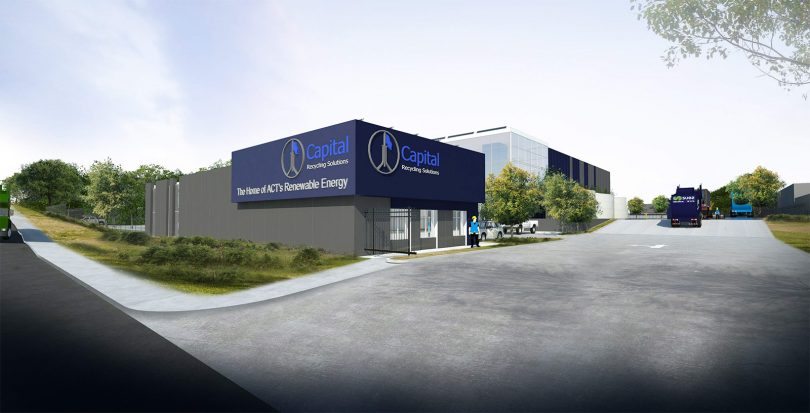
Capital Recycling Solutions’ Fyshwick waste burner proposal should have triple the normal consultation period for its Environmental Impact Study so the community can adequately digest what will be a large and highly technical document, according to the Inner South Canberra Community Council.
The council also wants any waste to energy proposals assessed in the context of an agreed ACT Strategic Waste Management Strategy, as well as an air quality impact study.
CRS has proposed a $200 million combined waste to energy and recycling plant in Fyshwick that will burn rubbish that would normally go to landfill to produce base-load electricity to power 28,000 homes. It is currently preparing it’s EIS for submission.
The normal 20-day consultation period would be ‘manifestly inadequate’ given the magnitude of the proposal and the likely size of the EIS, the chair of the ISCCC chair Marea Fatseas said in a letter to the Chief Minister, Andrew Barr.
CRS’s EIS is expected to be many hundreds of pages long filled with technical information, and the company has indicated it is not opposed to a longer consultation period.
“The ISCCC’s view is that a consultation period of 60 working days would be appropriate under the circumstances, although a consultation period longer than this would be welcome,” Ms Fatseas said.
She said the Christmas-New Year holiday shutdown in Canberra also complicated the timing of any consultation period, with normalcy not returning until after Australia Day.
“We seek your commitment on behalf of the ACT Government that the EIS for the Fyshwick Energy to Waste proposal will be no less than 60 working days (three months), and that the period 15 December 2017 to 15 January 2018 will not be counted as part of the EIS consultation period,” Ms Fatseas said.
“In addition, the ISCCC considers that any waste to energy proposals should be assessed in the context of an agreed ACT Strategic Waste Management Strategy. We consequently seek your assurance that no decision will be taken by the ACT Government on this proposal until its consistency with such a Waste Management Strategy can be determined.”
Ms Fatseas said the impact of such a facility on the air quality of ACT residents could not be fully determined without a baseline assessment of air quality.
“We therefore call on the ACT Government to provide funding to enable the Environmental Protection Authority to complete such a 12-month baseline air quality study, so that the impact on total ambient particulates and toxic emissions of the proposed CRS facility, and any other similar proposals, can be determined,” she said.
“This would involve the establishment of monitoring stations at locations that will take into account the temperature inversions that occur in Canberra.”
Ms Fatseas said the overwhelming majority of people who attended a public forum in August had been opposed to the proposal, while others sought more information.
She said the ISCCC believed the Fyshwick proposal is but one of a number of responses to the Government’s market sounding exercise of February 2017 on waste management.












